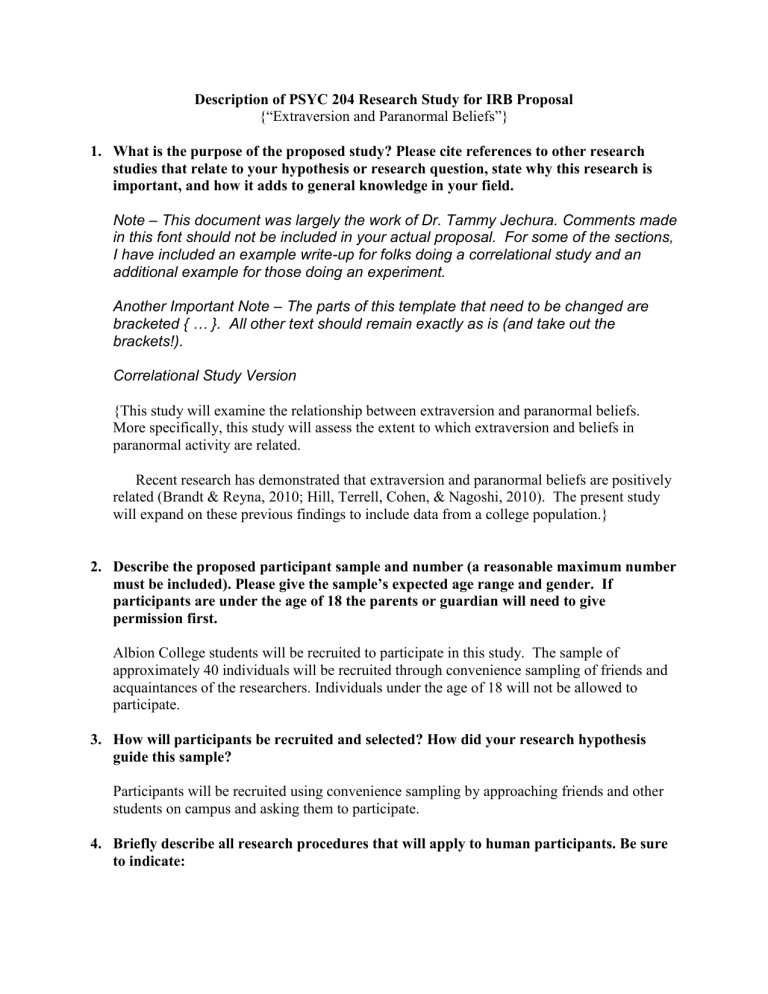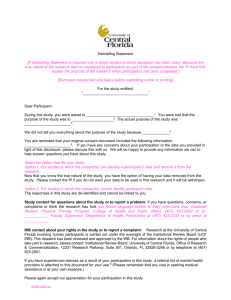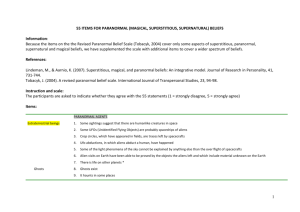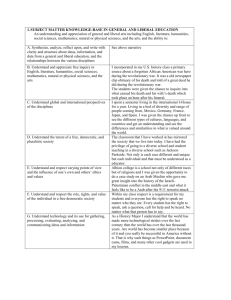template - Albion College

Description of PSYC 204 Research Study for IRB Proposal
{“Extraversion and Paranormal Beliefs”}
1. What is the purpose of the proposed study? Please cite references to other research studies that relate to your hypothesis or research question, state why this research is important, and how it adds to general knowledge in your field.
Note – This document was largely the work of Dr. Tammy Jechura. Comments made in this font should not be included in your actual proposal. For some of the sections,
I have included an example write-up for folks doing a correlational study and an additional example for those doing an experiment.
Another Important Note – The parts of this template that need to be changed are bracketed { … }. All other text should remain exactly as is (and take out the brackets!).
Correlational Study Version
{This study will examine the relationship between extraversion and paranormal beliefs.
More specifically, this study will assess the extent to which extraversion and beliefs in paranormal activity are related.
Recent research has demonstrated that extraversion and paranormal beliefs are positively related (Brandt & Reyna, 2010; Hill, Terrell, Cohen, & Nagoshi, 2010). The present study will expand on these previous findings to include data from a college population.}
2. Describe the proposed participant sample and number (a reasonable maximum number must be included). Please give the sample’s expected age range and gender. If participants are under the age of 18 the parents or guardian will need to give permission first.
Albion College students will be recruited to participate in this study. The sample of approximately 40 individuals will be recruited through convenience sampling of friends and acquaintances of the researchers. Individuals under the age of 18 will not be allowed to participate.
3. How will participants be recruited and selected? How did your research hypothesis guide this sample?
Participants will be recruited using convenience sampling by approaching friends and other students on campus and asking them to participate.
4. Briefly describe all research procedures that will apply to human participants. Be sure to indicate:
a) approximately how much time each participant is expected to devote to the research.
Participation in this study should take no more than {30 minutes}. b) how data will be collected and recorded (with or without identifiers? what instruments, materials, or equipment will be used? will audio- or videotapes be employed in data collection?). Attach copies of all written instruments and/or describe any apparatus with which participants will be in direct contact.
Correlational Study Version
Informed consent, 2 survey measures, and debriefing form are attached. The attached materials include two well-established, psychological measures of {perceptions and attitudes}. These measures have been labeled in the attached materials, and references are included.
{Participants will be asked to provide demographic information, including gender and age, a subjective measure of frequency of religious service attendance, and a survey about paranormal beliefs.} Following completion of these materials, participants will receive the debriefing form.
{In line with recent findings reported by Hill et al. (2010) and Brandt and Reyna (2010), we hypothesize that extraversion should be positively related to beliefs in paranormal activity.} c) methods for obtaining informed consent or assent in the case of minors. For minors, indicate how the consent of parents or legal guardians will also be obtained. Attach copies of all materials used to obtain informed consent or assent. See Informed
Consent or Parental Permission templates.
Before completing any of the procedures or materials, participants will be asked to read and sign an informed consent form (attached). Only participants who indicate that they are at least 18 years of age will be allowed to participate. d) methods for preserving confidentiality (including plans for storing/disposing of tapes and other data records at the conclusion of the research). Normally data should be stored for seven years upon completion of the data collection in a locked cabinet in a faculty member’s office or lab. If your unencrypted laptop computer used for data storage is lost, you must report it immediately to IRB@albion.edu
.
Participant survey materials will be assigned individual numbers, and participants will not be connected, in any way, with their survey responses. Participants’ informed consents will be stored in a separate physical location from completed surveys, to ensure that they cannot be linked with individual survey responses. All materials will be stored in the researcher’s dorm room and turned in to Dr. Wilson as soon as data entry is
complete. Dr. Wilson will destroy all consent forms and surveys within a year of conclusion of the project. Until that time, completed informed consents and surveys will be locked in separate storage cabinets in Olin Hall rooms 322 and 129. e) if deception is to be employed, provide a scientific justification for its use and describe debriefing procedures. [NB: If the research is such that debriefing cannot be carried out, the project must be submitted for full IRB review.]
This study does not involve deception, though the complete purpose of the study will not be disclosed fully until the end of each research session to reduce socially desirable and/or biased responding.
5. Indicate any benefits that are expected to accrue to participants as a result of their involvement in the research. In the event that participants will be paid, describe all payment arrangements, including how much participants will be paid should they choose to withdraw from the study prior to completion of the research.
There is no benefit to participants, but it is hoped that the present research will contribute to the understanding of {extraversion and paranormal beliefs}.
6. Describe any relationship between researcher and participants, such as: teacher/student; superintendent/principal/teacher; employer/employee. If such a relationship exists, how will it affect the participant's ability to take part voluntarily and how will the principal investigator handle it?
Some participants may be personal friends, acquaintances, and/or classmates of the researchers. All participants will be assured that participation is completely voluntary.
Participants will also be reminded that they may stop participation at any time with absolutely no negative consequences from the researchers of any constituencies at Albion
College.
Albion College Consent to Participate in Research
Study Title: {Title of the Study}
Researcher: {Your Name}, Psychological Science Student
Sponsor: Dr. W. Jeffrey Wilson, Professor of Psychological Science
This is a consent form for research participation. It contains important information about this research study and what to expect if you decide to participate.
Your participation is voluntary. Please consider the information carefully. Feel free to ask questions before making your decision whether or not to participate. If you decide to participate, you will be asked to sign this form and will receive a copy of the form if you so desire.
Purpose: { The goal of this research study is to examine the relationship between personality and paranormal beliefs. More specifically, the present study looks at how extraversion is related to paranormal beliefs.}
Procedures/Tasks: In this study, you will be asked to {complete a paper-and-pencil/pen questionnaire that contains two established measures of personality and attitudes}. You will also be asked to answer some basic demographic questions, such as age and gender. Please recognize that there is no “right” or “wrong” response to any of the questions. Most of the questions ask only about your personal opinion. As such, we request that you be forthright in your responses. If at any time you are uncomfortable {answering a question or performing a task}, feel free to skip the {question or task}.
Duration: Completing the survey should take around {30 minutes.}
You may leave the study at any time. If you decide to stop participating in the study, there will be no penalty to you, and you will not lose any benefits to which you are otherwise entitled. Your decision will not affect your future relationship with Albion College or any of the researchers.
Risks and Benefits: There are minimal risks for participating in this study. The risks of this study are not expected to exceed possible risks of everyday interaction. You will not be compensated for participating in this study. You are not expected to benefit personally by participating in this study, though we do hope that this research will help us to better understand {the relationship between XX and YY.}
Confidentiality: Efforts will be made to keep your study-related information confidential. However, there may be circumstances where this information must be released. For example, personal information regarding your participation in this study may be disclosed if required by state law.
Again, if at any time you are uncomfortable answering a question, feel free to skip the question.
Incentives: There is no incentive to participate in this study.
Participant Rights: You may refuse to participate in this study without penalty or loss of benefits to which you are otherwise entitled.
If you choose to participate in the study, you may discontinue participation at any time without penalty or loss of benefits. By signing this form, you do not give up any personal legal rights you may have as a participant in this study.
An Institutional Review Board responsible for human participant research at Albion College reviewed this research project and found it to be acceptable, according to applicable state and federal regulations and College policies designed to protect the rights and welfare of participants in research.
Contacts and Questions: For questions, concerns, or complaints about the study you may contact
{Your Name} by email at {YourEmail@albion.edu} or Dr. W. Jeffrey Wilson at (517) 629-0393 or by email at wjwilson@albion.edu.
Thank you!
{Your Name}
Signing the consent form
I have read (or someone has read to me) this form and I am aware that I am being asked to participate in a research study. I have had the opportunity to ask questions and have had them answered to my satisfaction. I voluntarily agree to participate in this study.
I am not giving up any legal rights by signing this form. I will be given a copy of this form if I request it .
Printed name of participant
__________________________
Date
Signature of participant
Note – The following are example materials. Please format your own materials as neatly and as clearly as possible. In addition, you must include a citation and its associated reference, for each established scale that you include.
Demographic Information
1. Sex (circle one) Female Male
2. Age (in years) __________
3. Any other variable that might be needed for your study
Survey 1: {Personality}
[ Ambivalent Sexism Inventory; Glick & Fiske, 1996 ]
Below is a series of statements concerning men and women and their relationships in contemporary society. Please indicate the degree to which you agree or disagree with each statement using the following scale:
0 = disagree strongly
1 = disagree somewhat
2 = disagree slightly
3 = agree slightly
4 = agree somewhat
5 = agree strongly
_____ 1. No matter how accomplished he is, a man is not truly complete as a person unless he has the love of a woman.
_____ 2. Many women are actually seeking special favors, such as hiring policies that favor them over men, under the guise of asking for "equality."
_____ 3. In a disaster, women ought not necessarily to be rescued before men.
_____ 4. Most women interpret innocent remarks or acts as being sexist.
_____ 5. Women are too easily offended.
_____ 6. People are often truly happy in life without being romantically involved with a member of the other sex.
_____ 7. Feminists are not seeking for women to have more power than men.
_____ 8. Many women have a quality of purity that few men possess.
_____ 9. Women should be cherished and protected by men.
_____ 10. Most women fail to appreciate fully all that men do for them.
_____ 11. Women seek to gain power by getting control over men.
_____ 12. Every man ought to have a woman whom he adores.
_____ 13. Men are complete without women.
_____ 14. Women exaggerate problems they have at work.
_____ 15. Once a woman gets a man to commit to her, she usually tries to put him on a tight leash.
_____ 16. When women lose to men in a fair competition, they typically complain about being discriminated against.
_____ 17. A good woman should be set on a pedestal by her man.
_____ 18. There are actually very few women who get a kick out of teasing men by seeming sexually available and then refusing male advances.
_____ 19. Women, compared to men, tend to have a superior moral sensibility.
_____ 20. Men should be willing to sacrifice their own well-being in order to provide financially for the women in their lives.
_____ 21. Feminists are making entirely reasonable demands of men.
_____ 22. Women, as compared to men, tend to have a more refined sense of culture and good taste.
Survey 2: {Paranormal Beliefs}
[13-Item Marlow-Crowne Social Desirability Scale; Reynolds, 1982]
Best to NOT use T/F questions!
Below is a series of 13 statements. Please indicate whether the statement is True (T) or False
(F) for you. If you are unable to decide about a statement, please indicate whether the statement is generally True (T) or False (F) about you.
1) T F It is sometimes hard for me to go on with my work if I am not encouraged.
2) T F
I sometimes feel resentful when I don’t get my way.
3) T F On a few occasions, I have given up doing something because I thought too little of my ability.
4) T F There have been times when I felt like rebelling against people in authority even though I knew they were right.
5) T F No matter who I’m talking to, I’m always a good listener.
6) T F There have been occasions when I took advantage of someone.
7) T F I’m always willing to admit it when I make a mistake.
8) T F I sometimes try to get even rather than forgive and forget.
9) T F I am always courteous, even to people who are disagreeable.
10) T F I have never been irked when people expressed ideas very different from my own.
11) T F There have been times when I was quite jealous of the good fortune of others.
12) T F I am sometimes irritated by people who ask favors of me.
13) T F I have never deliberately said something that hurt someone’s feelings.
Debriefing Form for the Research Study:
Personal Beliefs and Social Attitudes
Thank you for your help with our project. In this study, we were interested to learn whether
{extraversion is related to paranormal beliefs.}
Prior research {has found an unclear relationship between religiousness and attitudes toward these groups of people. In some studies, religiousness is related to more positive attitudes toward these groups, whereas in other studies religiousness has been related to more negative attitudes toward these groups. We are interested in better understanding this relationship by looking at a college population to explain the connections.}
With the data that you and others have provided, {we will now look to see how religious beliefs might be related to beliefs about paranormal activity.} It is important to note that your {answers on the questionnaire, survey responses, behavioral measures} will never be linked in any way with your name. Your data will remain completely anonymous. Should any research reports be published, only aggregate data and no individual responses will be used.
For purposes of the study’s integrity, we ask that you please do not discuss your participation in this study. As you can surely appreciate, participants with full knowledge of what the researchers are investigating might respond differently from those who are naïve to the research question.
Following completion of the study, if you would like to be informed about the findings, please feel free to contact {Your Name} at {Your Email}@albion.edu. If you have any questions or concerns about your participation, please contact Dr. W. Jeffrey Wilson at wjwilson@albion.edu or (517) 629-0393.
Thank you very much for your participation in this research!
{Your Name}
Note – You should include your references, both for your project description and your included materials
References
Brandt, M. J., & Reyna, C. (2010). The role of prejudice and need for closure in religious fundamentalism. Personality and Social Psychology Bulletin, 36, 715-725.
Christopher, A. N., & Wojda, M. R. (2008). Social dominance orientation, right-wing authoritarianism, sexism, and prejudice toward women in the workforce. Psychology of
Women Quarterly, 32, 65-73.
Glick, P., & Fiske, S. T. (1996). The Ambivalent Sexism Inventory: Differentiating hostile and benevolent sexism. Journal of Personality and Social Psychology, 70, 491-512.








